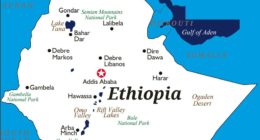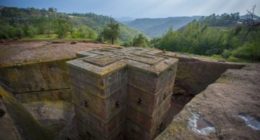Wildlife and vegetation
- Ethiopia is home to the most indigenous plants and the rarest wildlife in the world.
- Interestingly, the country is endowed with diverse topographical features. These encompasses of flat plateaus, lush rivers, rugged mountains and beautiful plains.
- Vegetation here has always been described as Afro-montane and Afro-alpine respectively.
Wildlife
- Endemic species have long been discovered to be in the Ethiopian mountainous forests.
- Simien mountains is a home to the rarest and large mammals such as the Walia Ibex, a wolf believed to be endangered and the Gelada Monkeys.
- Unfortunately, due to deforestation as a result of human settlement, these species’ number has declined over time.
Religious and cultural sacred sights
- Ethiopians are mysterious beings whose history and way of life dates back to the ancient churches in history.
- Consequently, the most stunning sacred place worth stopping at is Lalibela that act as an important symbol of old Jerusalem which is believed fell on the hands of a Muslim leader called Saladin.
Waste and its disposal
- Larger percentage of people in rural and urban areas have adopted improper practices of waste disposal due to lack of knowledge on waste management.
- Expect to see dumping of wastes everywhere even in the capital and smaller cities.
- Most people here do not have access to door to door waste collection done by manual workers in the city and rural areas.
- With these therefore, there is an urgent need to create awareness to the citizens on the proper mechanisms of waste disposal.
- A great improvement on the door to door waste collection also has to be seriously enhanced.
Time concept and punctuality
- Just like any African country, time concept in Ethiopia is not held with much importance.
- Rigidity in schedules and meetings is not part of the Ethiopian culture. Meetings here are known to start with lots of social pleasantries characterized with drinking coffee and tea.
Office hours and weekend concept
- Offices here open at 8:30am to 5:30pm in the evening with lunch-breaks running from 12:30pm to1:30pm on Mondays to Thursdays.
- Fridays is an exceptional day as work starts at 11:30am to 1:30pm. With Saturdays, work begins at 8am to 12pm and offices are never open on Sundays.
Public holidays
- Ethiopian calendar has lots of public holidays running throughout the year with the most remarkable ones being on September 11th where people celebrate the Ethiopian New Year.
- On September 27th, locals here celebrate The Finding of the True Cross (Meskel), January 7th is the Ethiopian Christmas, January 19th is the Ethiopian Epiphany and January 24th is Prophet Mohammed’s Birthday (Maulid).
- Public holidays in the country are held with utmost importance and respect



